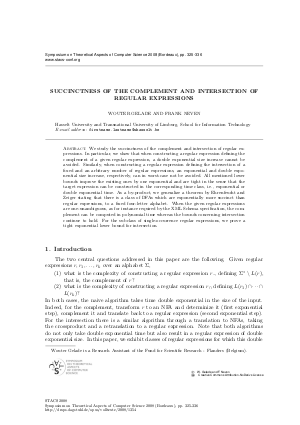Succinctness of the Complement and Intersection of Regular Expressions
Authors Wouter Gelade, Frank Neven
-
Part of:
Volume:
25th International Symposium on Theoretical Aspects of Computer Science (STACS 2008)
Part of: Series: Leibniz International Proceedings in Informatics (LIPIcs)
Part of: Conference: Symposium on Theoretical Aspects of Computer Science (STACS) - License:
 Creative Commons Attribution-NoDerivs 3.0 Unported license
Creative Commons Attribution-NoDerivs 3.0 Unported license
- Publication Date: 2008-02-06
File

PDF
LIPIcs.STACS.2008.1354.pdf
- Filesize: 181 kB
- 12 pages
Document Identifiers
Metrics
- Access Statistics
-
Total Accesses (updated on a weekly basis)
0Document
0Metadata
Abstract
We study the succinctness of the complement and intersection of regular expressions. In particular, we show that when constructing a regular expression defining the complement of a given regular expression, a double exponential size increase cannot be avoided. Similarly, when constructing a regular expression defining the intersection of a fixed and an arbitrary number of regular expressions, an exponential and double exponential size increase, respectively, can in worst-case not be avoided. All mentioned lower bounds improve the existing ones by one exponential and are tight in the sense that the target expression can be constructed in the corresponding time class, i.e., exponential or double exponential time. As a by-product, we generalize a theorem by Ehrenfeucht and Zeiger stating that there is a class of DFAs which are exponentially more succinct than regular expressions, to a fixed four-letter alphabet. When the given regular expressions are one-unambiguous, as for instance required by the XML Schema specification, the complement can be computed in polynomial time whereas the bounds concerning intersection continue to hold. For the subclass of single-occurrence regular expressions, we prove a tight exponential lower bound for intersection.
Cite As Get BibTex
Wouter Gelade and Frank Neven. Succinctness of the Complement and Intersection of Regular Expressions. In 25th International Symposium on Theoretical Aspects of Computer Science. Leibniz International Proceedings in Informatics (LIPIcs), Volume 1, pp. 325-336, Schloss Dagstuhl – Leibniz-Zentrum für Informatik (2008)
https://doi.org/10.4230/LIPIcs.STACS.2008.1354
BibTex
@InProceedings{gelade_et_al:LIPIcs.STACS.2008.1354,
author = {Gelade, Wouter and Neven, Frank},
title = {{Succinctness of the Complement and Intersection of Regular Expressions}},
booktitle = {25th International Symposium on Theoretical Aspects of Computer Science},
pages = {325--336},
series = {Leibniz International Proceedings in Informatics (LIPIcs)},
ISBN = {978-3-939897-06-4},
ISSN = {1868-8969},
year = {2008},
volume = {1},
editor = {Albers, Susanne and Weil, Pascal},
publisher = {Schloss Dagstuhl -- Leibniz-Zentrum f{\"u}r Informatik},
address = {Dagstuhl, Germany},
URL = {https://drops.dagstuhl.de/entities/document/10.4230/LIPIcs.STACS.2008.1354},
URN = {urn:nbn:de:0030-drops-13541},
doi = {10.4230/LIPIcs.STACS.2008.1354},
annote = {Keywords: }
}
